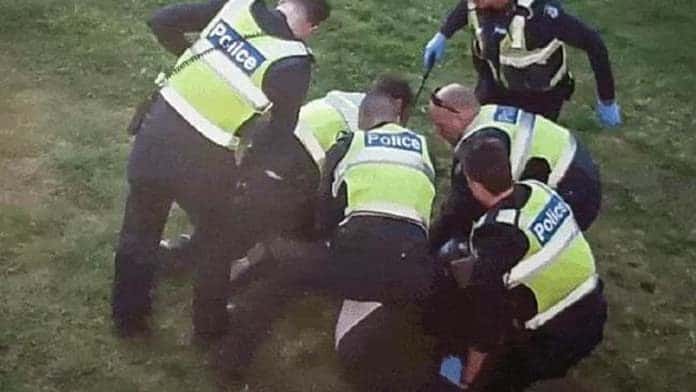Jordi Pardoel looks at Lenin’s State and Revolution and why the capitalist state cannot be reformed or taken over through parliament by workers and the oppressed
It is common sense for most people who want to change the world to try to elect people to parliament who have our interests at heart.
Huge numbers of young people in the US have been inspired by the rise of Democratic Socialists like Alexandria Ocasio Cortez (AOC) and Rashida Tlaib and their talk of radical change. Many here put their hopes in The Greens winning more influence in parliament.
Behind this is the idea of using the existing state to change society.
Vladimir I. Lenin’s book State and Revolution was written over a century ago, during the Russian revolution of 1917. But it remains relevant in explaining the nature of the capitalist state and why it cannot be wielded in the interests of workers and the oppressed.
Lenin argued that the state is not a neutral body but is fundamentally an organ which maintains the capitalist system. To truly transform society the state needs to be smashed and replaced with a radically different form of democracy—workers’ power.
The state under capitalism
The starting point for Lenin is that the state is a product of the class antagonisms inherent to capitalist society. The state emerged historically only when society became split into classes: exploiter and exploited.
The state, far from working to reconcile the interests of the different classes in society, grew out of the necessity for the dominant class to use force to maintain their control.
Today’s society is divided primarily between the capitalists, who own and control all aspects of production, and the working class, whose survival depends on selling their labour power for wages.
Capitalists are able to increase their profits by holding down workers’ wages and working conditions. These two classes thus have fundamentally opposed and “irreconcilable interests”.
To demonstrate the class character of the state Lenin points to the institutions that constitute it: the massive bureaucracy, the legal system and, at its core, the “special bodies of armed men”—the police, the military, prisons and intelligence agencies.
These institutions are not just tied to the capitalist class, as Lenin says, “by a thousand golden threads” but they were shaped by the development of capitalist society.
These institutions are profoundly undemocratic and unaccountable.
They are run along strict hierarchies and those who are at the top—senior public servants, the judges, the police commissioners and generals—are drawn overwhelmingly from privileged backgrounds.
They share the same worldview as the bosses and the rest of the ruling class and have a material stake in the system, with massively bloated salaries.
Judges, for instance, are notoriously conservative and tend to be far more sympathetic to any members of the elite who come before them than those from poor or working class backgrounds.
The District Court judge in Sydney who recently overturned a conviction for assault against an old boy of Knox Grammar, issuing a string of sexist comments along the way, is one recent example.
We are told that the police are there to protect us but we see again and again how they function as the hired thugs of the ruling class.
During the COVID lockdowns, we saw the police used to impose discriminatory restrictions targeted at people in Western Sydney, and hand out tens of thousands of dollars in punitive fines.
It is the police that are used to violently break up workers’ picket lines, smash protests, reinforce racism and harass and detain poor and oppressed people.
As the Black Lives Matter protests underscore, they routinely shoot and kill Indigenous people in Australia and Black people in the US.
Earlier this year at Coles’ Smeaton Grange distribution centre, the police were used to threaten workers on strike with arrest when they tried to picket scab labour at pop-up distribution sheds, set up to undermine the strike.
But it was legal for a corporation to lock-out its workers for months over Christmas.
Police repressed student protests against sackings and course cuts at the University of Sydney last year. But university bosses don’t face such opposition for sacking thousands of university staff in the middle of a pandemic.
Ultimately, the role of the police is to be on the front line of upholding capitalist property and profits, backed up by the legal and prison systems.
Reforming the state?
Many parties and organisations have long argued that because we have won universal suffrage and parliamentary democracy, socialists can win a majority in parliament and use that control to tame and reform the state and subordinate capitalist rule to promote working class interests.
Lenin wrote State and Revolution to “reestablish what Marx really taught on the subject of the state”.
His main target was Karl Kautsky, the key theorist of the German Social Democratic Party (SPD) and the Second International, which grouped together socialist parties across Europe.
Kautsky claimed to be a Marxist but, Lenin wrote, had forgotten a fundamental principle of Marxism: that the emancipation of the working class could not happen “without the destruction of the apparatus of state power which was created by the ruling class”.
Kautsky’s desire to use parliament and the state as a tool for change led the SPD to identify with the state and with the interests of the German ruling class.
This resulted in the SPD supporting Germany against its rivals in the First World War.
Similarly, today left-wing Democrats like AOC who were elected for championing policies of taxing the rich and opposition to America’s imperialist ventures around the world, refused to vote against military funding for Israel and has defended Joe Biden and the Democrats on climate policy even after many of his major spending plans on climate were dumped, telling the COP26 summit that the US government was now “not just back” engaging with international summits but “We’re different and we’re more just”.
In the 100 years since Lenin wrote State and Revolution we have repeatedly seen the vindication of his argument that change cannot come through parliament.
When the Labor prime minister Chifley tried to nationalise the banks in 1947, the High Court and British Privy Council ruled the move “unconstitutional” even though it had been supported by both houses of parliament.
In Greece in 2015, the Syriza government which had been elected on a promise to reverse austerity was blackmailed and threatened with bankruptcy by the European Central Bank and the International Monetary Fund.
If the obstructions from unelected state bureaucrats and financial institutions fail, the state will turn to more violent means—the police and the military.
In Chile in 1973, a socialist, Salvadore Allende, was elected president and tried to begin the implementation of sweeping reforms.
In response he was overthrown in a military coup and tens of thousands of ordinary people who supported him were murdered.
The revolution still unfolding in Sudan has also demonstrated the need to completely smash and dismantle the existing state institutions to bring change. After a popular uprising overthrew the old dictator in 2019, the military which sat behind him made concessions to allow civilian rule, with the promise to hold elections. But as the recent military coup shows, the old state remains determined not to lose control. Violence is the ruling class’s last line of defence against the threat of serious change.
Workers’ state
But what, if anything, replaces the old state? In 1917 in Russia the question of state power was a live issue as workers were on the verge of taking power into their own hands.
Lenin drew on the experience of the mass of workers in Paris in 1871 to answer these questions.
The Paris Commune—the first workers’ state in history—was a completely new type of government based on “municipal councillors, chosen by universal suffrage in the various wards of Paris” recallable at any time and paid an average worker’s wage.
Lenin, quoting Marx, points out it was “a working, not a parliamentary, body, executive and legislative at the same time”. In other words, those elected, unlike politicians today, had to carry out the decisions made in practice.
Crucially, the first decree of the new state was the “suppression of the standing army, and its replacement by the armed people …”
Instead of a specialised, separate body run by a small group of unelected people, there was simply the armed people with recallable representatives elected from the mass of workers.
Lenin concludes: “The Commune, therefore, appears to have replaced the smashed state machine ‘only’ by fuller democracy … democracy, introduced as fully and consistently as is at all conceivable, is transformed from bourgeois into proletarian democracy; from the state (= a special force for the suppression of a particular class) into something which is no longer the state proper.”
Soviets, the Russian word for workers’ councils, had already been established in Russia after millions of workers toppled the Tsarist regime in February.
These councils were made up of delegates elected from workplaces. The soviets were a means of coordinating the revolutionary struggle, but Lenin also saw them as the embryo of the workers’ state.
The soviets were more democratic than any parliament, made up of delegates who were immediately recallable by their electors.
Their power was based on democratic control of the economy through workers’ power in the factories.
Lenin and the Bolshevik Party argued for the soviets to overthrow the existing state and take power.
In October 1917 the soviets established a workers’ state. The working class drove the police off the streets, the military disintegrated as soldiers mutinied, workers paralysed entire industries and ultimately wrenched control of the economy from the bosses.
Lenin’s arguments in State and Revolution are still relevant to how we organise today.
It is in our workplaces and communities, not parliament, that the power lies to win real change and it is here where we will build the power to smash the existing state and establish a completely new society.






